Developer: New World Computing
Release Date: June 1, 2001
Did you like Heroes of Might and Magic III and want more of it? Like a lot more? Good news - between 1999 and 2001 New World Computing put out eight expansion packs under the heading of Heroes Chronicles. Some were retail, others were free, but retailers like GOG have collected them all into one package.
Note that the way VCMI works you will also need the base Heroes of Might and Magic III game installed.
Although my aim is to host signed and notarized game bundles on Mac Source Ports, the VCMI project recently added Apple Silicon support and is sufficiently complex that at this time I'm going to link to their work. We may host a notarized version in the future.
Because the app bundle is not notarized, on first run you may run into issues. The shortest answer is to right-click on the app bundle (VCMI.app) and select Open. The long answer is here.

Developer: Altered Orbit Studios
Release Date: May 31, 2024
Source Code Release Date: May 31, 2024
It's impressive that the DOOM runs om everything. It's more impressive that the GZDoom project has turned the DOOM engine into an extremely versatile piece of software. There's a smattering of standalone games out there running on some variant of DOOM or GZDoom and one of the most amazing recent entries is Selaco.
Back when this game came out I and a few others tried building it for the Mac and there were graphical issues due to modifications made to the OpenGL renderer. More recently, CrowEater figured out the trick to building and packaging it for the Mac with MoltenVK to use the Vulkan renderer by default and the result is being able to play this frenetic boomer shooter on the Mac.
Note that this is an Early Access game both in the sense that the game itself is Early Access on Steam and also that this port is a work in progress. One known issue is that the opening splash screen is pink. Another is that sometimes when you die in the game you don't see the proper death animation but rather something that looks like an in-game error. But look past these and you'll find an excellent game to blast your way through.
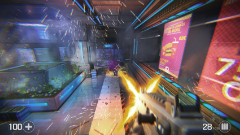
For more information on getting the game's data onto your Mac check our FAQ
Developer: Totally Games
Release Date: March 23, 1999
The last of the original line of Star Wars space combat games, Star Wars: X-Wing Alliance represents the culmination of the series with both single and multiplayer modes, a more modern game engine, and fully voiced in-game dialouge.
NOTE: this game requires a joystick and apparently they're not kidding about that as it kicks you out if it doesn't detect one.
At the time of this posting, DREAMM 4.0 is in beta so I am labeling this Early Access for now.
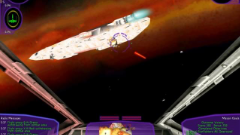
For more information on getting the game's data onto your Mac check our FAQ
Developer: Totally Games
Release Date: April 29, 1997
Originally launched as a multiplayer sequel to both the X-Wing and the TIE Fighter series, Star Wars: X-Wing vs. TIE Fighter launched to mixed reviews due to the early state of late 90's multiplayer. A later expansion pack, the Balance of Power campaign (included in most modern digital versions) added a single player campaign.
NOTE: this game requires a joystick and apparently they're not kidding about that as it kicks you out if it doesn't detect one.
At the time of this posting, DREAMM 4.0 is in beta so I am labeling this Early Access for now.
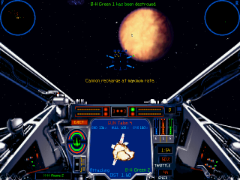
For more information on getting the game's data onto your Mac check our FAQ
Developer: LucasArts
Release Date: May 18, 1999
Regarded by some people as the best thing to come out of the prequel trilogy, Star Wars Episode I: Racer does exactly what it says on the tin: it's a pod racing game like the scene in The Phantom Menace. It has the teltale signs of a Nintendo 64 game that was also ported to PC and it shows, for better or worse.
At the time of this posting, DREAMM 4.0 is in beta so I am labeling this Early Access for now.
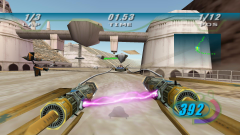
For more information on getting the game's data onto your Mac check our FAQ
Developer: Factor 5
Release Date: December 3, 1998
An arcade-style flight action game, Star Wars: Rogue Squadron 3D is a game inspired by everyone's favorite level from Shadows of the Empire. It has the telltale signs of being a Nintendo 64 game that was also ported to the PC, for better or worse.
At the time of this posting, DREAMM 4.0 is in beta so I am labeling this Early Access for now.
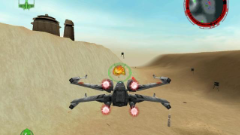
For more information on getting the game's data onto your Mac check our FAQ
Developer: LucasArts
Release Date: March 25, 1998
OK, true story: when this game was released the critics hated it. Most people hated it. However, in my college dorm two of my friends who lived across the hall played the demo from the PC Gamer demo disc and went and bought the game and played the game to death.
Star Wars: Rebellion is a 4X strategy game that was my first introduction to the concept of a game which reviews poorly but for some folks, it matches their wavelength perfectly. It's also something of a cult classic as it has been retroactively reviewed more positively.
At the time of this posting, DREAMM 4.0 is in beta so I am labeling this Early Access for now.
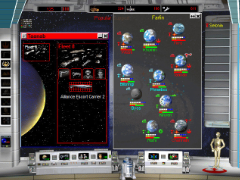
For more information on getting the game's data onto your Mac check our FAQ
Developer: John Calhoun
Release Date: 1994
Source Code Release Date: 2016
There's this fascinating book called The Secret History of Mac Gaming, which chronicles what gaming on the Mac was like prior to Mac OS X, back before 3D graphics were a thing and people were exploring what to do with this 512x342 graphics screen. An entire chapter titled "Quintessentially Mac" is dedicated John Calhoun and his games, in particular Glider.
Glider was one of those deceptively simple games - you maneuver a paper airplane through a house. Things like air conditioner vents and candles provide methods of keeping it aloft, and there's certain items you need to hit, and others you need to avoid. I'm going to confess that as I wasn't a Mac person back in the day I wasn't familiar with this game, but amongst those who were, Glider is a game treated with the same reverence as DOOM.
Being in the era when games when treated more like software than entertainment products there was the original Glider, then later a version for color Macs called Glider 4.0 that included a level editor, then a version that added more elements and was sold retail in a box called Glider PRO. In the years since the source code was released and Eric Lasota ported the game to modern systems, including Apple Silicon. It includes both the level editor as well as a simulated version of what it was like to play this on a Classic Macintosh.
This is the full game so you can download and play it immediately.
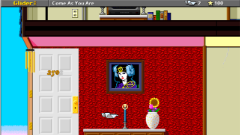
Developer: John Stiles
Release Date: 1996
Source Code Release Date: December 31, 2015
Candy Criis is an old shareware game smilar to the Puyo Puyo series where you match different colored candy pieces in pairs to form groups and clear them from the board. It was a Mac-exclusive cult classic shareware game in the 90's later ported to Windows. It's also the one Iliyas Jorio source port that I missed up until now as it wasn't on his itch.io which mostly highlights his Pangea Software ports.
This is the full game, no extra data needed, so you can download and play it immediately.
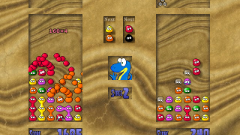
Developer: Impressions Games
Release Date: November 2, 1999
Pharaoh uses the engine from Caesar III but moves the setting to Ancient Egypt where you oversee the building of a city to ensure citizens are fed, employed, healthy and protected from diseases, disasters and wars. An expansion pack titled Cleopatra: Queen of the Nile followed in 2000, and modern digital retailers sell the pair as a bundle entitled Pharaoh + Cleopatra
Since the game was derived from the engine to Caesar III a source port called Akhenaten was forked from the Augustus source port to run the game.
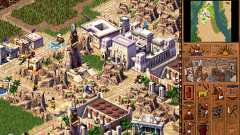
For more information on getting the game's data onto your Mac check our FAQ